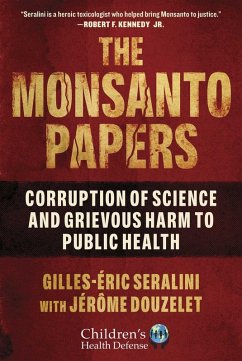A David and Goliath battle for truth A specialist in GM foods and pesticides, the biologist Gilles-Éric Seralini has studied their toxicity and effects on people's health for many years. In September 2012, for the first time in a major scientific journal (Food and Chemical Toxicology), he published a study showing the effect on the liver and kidneys of two of Monsanto's flagship products: Roundup weedkiller and the GM foods created to absorb it. Images from the study of tumor-ridden rats fed with GM foods and Roundup went viral. The study was a PR disaster for Monsanto. The multinational soon bounced back and did everything in its power to cover up the study-leaning on the publishers to retract the findings. Monsanto began a series of smear campaigns to discredit Seralini and fellow researchers and intimidate their supporters, while pumping out their own collection of fake research findings and testimonies. These practices were met with huge suspicion, but there was no concrete evidence until, in 2017, Monsanto was ordered to publish tens of thousands of confidential documents in a class-action lawsuit presented by thousands of individuals afflicted with serious illnesses from their use of Roundup. The "Monsanto Papers" that were produced subsequently proved the company's cynical attempts at a cover-up as well as its fraudulent practices. Gilles-Éric Seralini and Jérôme Douzelet delved into the documents and discovered how, in the pursuit of its own short term economic interests, Monsanto used sophisticated methods of deceit to bypass legislation devised to protect millions of people. Seralini and Douzelet discovered how Monsanto managed to provide phony assessments to conceal the poisons its products contain, thus deceiving the public authorities and the scientific and medical communities.
Dieser Download kann aus rechtlichen Gründen nur mit Rechnungsadresse in A, B, BG, CY, CZ, D, DK, EW, E, FIN, F, GR, HR, H, I, LT, L, LR, M, NL, PL, P, R, S, SLO, SK ausgeliefert werden.


